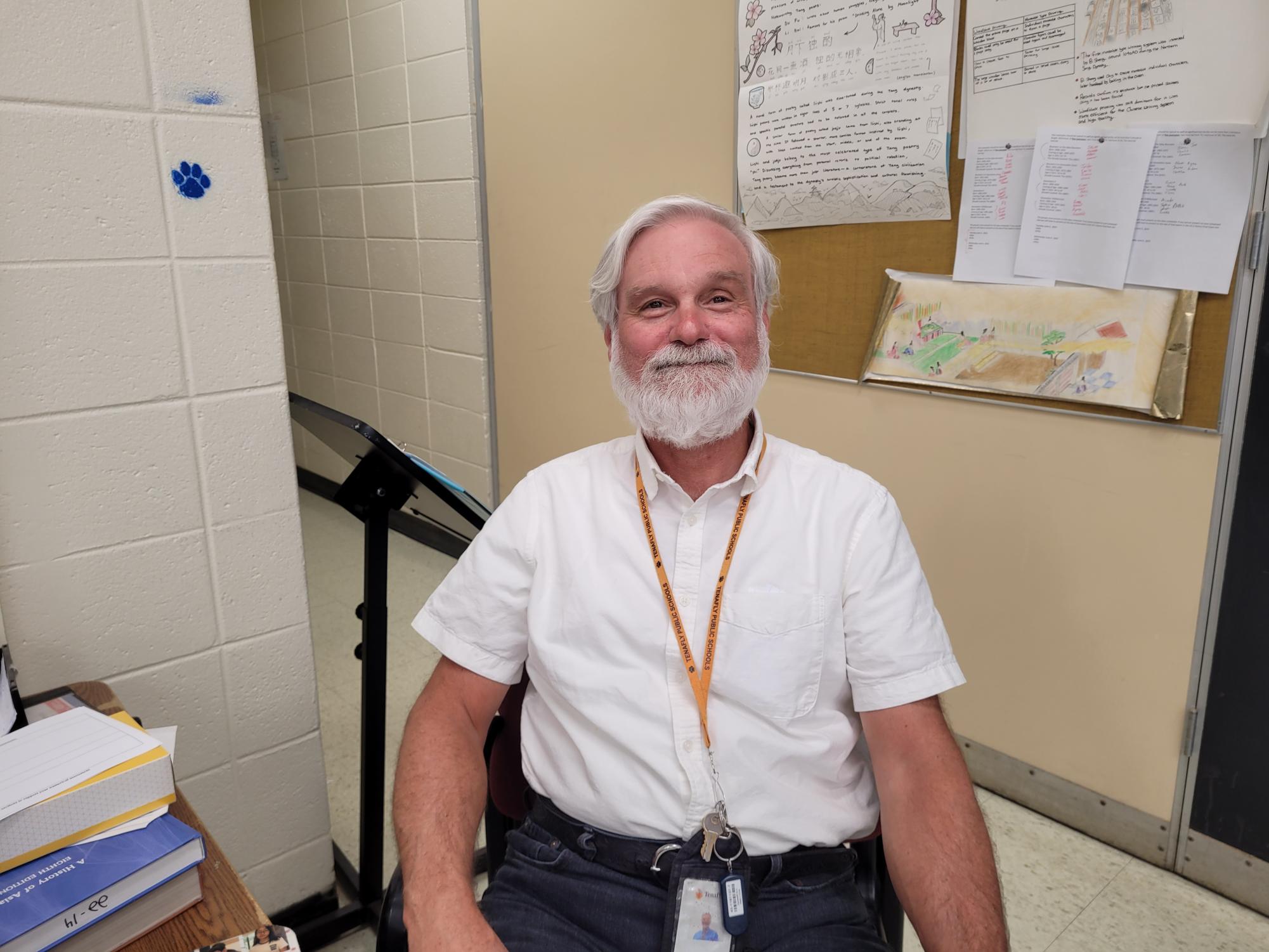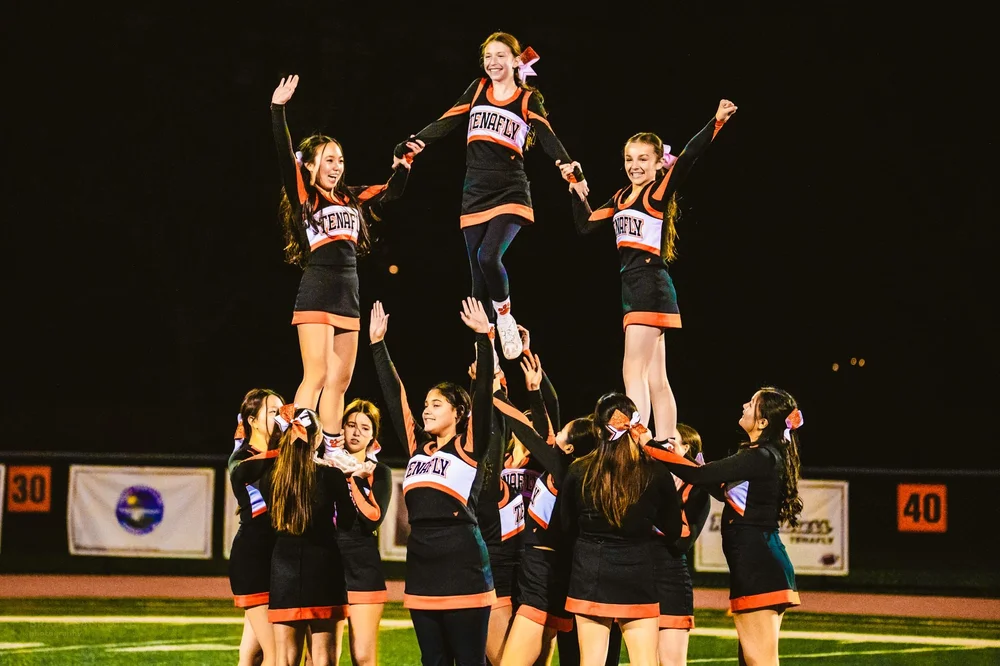For the last few years, THS has said goodbye to numerous teachers who had been part of the Tenafly community for decades. This year, Mr. Kenneth Barrett, the African and Asian Civilizations and Cultures Honors and American Experience teacher, has boarded the retirement train after a 36-year-long career at THS. As he prepares to open a new chapter in his life away from the busy life of full-time teaching, Barrett reflects on his time at Tenafly and the many thoughts and memories he’s developed since he first entered the school in 1989.
What classes do you teach?
I teach American Experience, which is for seniors, and I also teach the African-Asian Civilizations and Cultures Honors, which is a freshman class.
How long have you been a teacher, and how many years have you been at THS?
It’s the same, 36 years. This was my first teaching job. I came out of college, did my student teaching in Dumont High School, and got hired that July to teach here in 1989.
What drove you to pursue teaching?
I look at it as a calling. I actually didn’t start out of high school thinking I’d be a teacher. As people know, I didn’t go to college right away—I went to work right after high school. I worked for four years, one year working with a kitchen cabinet designer and installer, and then three years in a bank. But all during that time, I was working with young people through church, and I just felt it was a calling that I could pursue and be given a choice to do something I love, which was teaching.
I’ve been teaching a lot of young people in different contexts like Bible study and Sunday school. I also enjoyed the dynamic and thought, you know what, it might really be a calling to help impact the next generation in terms of setting an example and being a role model.
How did you find your interest in history?
Oh, I have liked history since high school.
I would say that I had really great humanities teachers, both in English and in social studies. I liked the causal relationships of history and the way you could look at people in the past and analyze the things they did, why they did those things, and what the impact was to see connections between the past and the present and understand causation and effect.
I liked that I really found that to be fascinating, as well as the idea of looking back and entering into a world that in some cases has been long gone from the present scene, but also to reconstruct it and try to understand that world through the eyes of the people who lived in it.
How do you think you changed as a teacher from the beginning of your career to now?
I would say that I was always interested in getting students engaged with the content, but over the years, I felt it more and more important to put the onus on the students to create and demonstrate and perform more of what they learned. Rather than simply me giving them information and talking about it in a discussion format and then assessing them, I found it much better to have them do more things like projects and presentations and performances, and I felt that a balance of those things with a more traditional lecture created the best learning environment.
What is one important thing you learned while teaching students?
One thing I learned is not to take yourself too seriously as a teacher. I think that when you’re working with adolescents, they have a tendency to be very transparent about whether or not they’re liking what’s going on or not liking what’s going on, and if you take yourself too seriously as a teacher, you may not be able to be flexible enough, have a sense of humor, or see the humor in things that are going on in the classroom on any given day.
How did you come to the decision to retire this year?
Oh, that’s an interesting one. The senior class, when they were freshmen, were the first class that was trying to be normal after COVID.
And while I could have retired any time over the last five years or so, I didn’t want to retire during COVID. I felt that I didn’t want to leave in that environment. I just wanted to see it through, see the students back to normalcy.
And so when the current seniors were freshmen, we had such a great experience that they were like, “Oh, you can’t retire until we have you as seniors. You have to last until we’re seniors.” I’m not saying that was the only reason or even the main reason, but it was one of the things in the back of my mind that if there was a class that I would wait to finish, it would be that class.
Then there are personal reasons. Over the last four years, my son had two children, so I’m a grandfather now. And my wife retired three years ago, and so she’s spending time with them.
There’s a lot of factors. It just felt like this was the right time to start a new chapter in my life.
How do you feel about the time you have taught in Tenafly overall?
I think it was wonderful. I really have no regrets in my career here. I really enjoyed every year. Every year had its challenges. There were some students who were tremendous students, tremendous people to see grow and change and have the opportunity—the privilege—to teach them.
I enjoyed what I taught. I’ve taught ninth grade history all 36 years. I’ve taught African-Asian History, and I’ve always enjoyed that curriculum.
I think the biggest thing, though, about being here has been my relationship with the students, just enjoying the dynamic in the classroom, trying to create the best possible learning environment for them and seeing them thrive in that environment.
What’s the most memorable moment in your career?
There are so many, it’s hard for me to pick out any one thing.
I mean, there have been funny moments where students acted in a way that was just kind of crazy. There were other moments of, you know, just being able to be a part of the school culture.
I think one of my favorite memorable moments was the Olympics, where I believe the junior class was doing a Star Wars theme—Mr. Mirabito was the advisor—and it was Jedi Juniors, and I showed up as Obi-Wan Kenobi in the opening ceremonies with the mascot and even had a lightsaber duel with Darth Maul. So it was kind of a fun moment in that regard.
In the classroom, there are just too many to even begin to recount.
What was your favorite thing about working here?
Like I said, the students, you know, but now I would really emphasize my colleagues as well. I mean, it’s no secret that I think the history department is the best department in the high school, but I also have enjoyed working with my colleagues.
They are a great group of people, and I don’t think I would have enjoyed the experience, especially in the second half of my career, without them. Seeing these younger teachers coming in and really beginning to show such a great promise and potential and really demonstrating expertise and skill. It’s been a lot of fun working with them and seeing them grow, and we have a great rapport in the department.
So yeah, I would say that it’s always been the students, but in the last half of my career, it’s been the people I’ve worked with.
Would you say that there’s something in Tenafly’s education that differentiates itself from other schools?
I think that Tenafly has always had very high standards and has always excelled at raising the expectations for the students and helping them achieve greater. I think that the other thing about Tenafly that has always stood out has been the almost college-like atmosphere that it’s encouraged in terms of the diversity of the courses and the way we handle discipline, like the open campus.
There are just a lot of things that have made Tenafly special over the years in terms of its culture and its environment.
What do you think you’re going to miss most about teaching here?
The people, and that would be both the staff and the students.
You know, I can always keep learning—I can always keep reading and studying, and I expect I’ll probably be doing that—but I’m definitely going to miss the people.
In your courses, you usually encourage objective perspectives on history and current events. What would you say is the importance of seeing things on both sides?
I think that the first thing that we have to recognize is that no one person or one perspective will have the whole truth.
Therefore, it’s important to listen to a diversity of opinions so that we can arrive closer to the truth. I think that at times, objectivity is lost. And sometimes the emotional investment people have on issues prevents them from hearing the other side, seeing the other perspective, or understanding where someone is coming from.
The other aspect of that is that as a teacher, it was always more important for me to get the students to think for themselves and to challenge perhaps preconceived ideas or to at least begin to analyze things in a way that would get them to form their own conclusions based on the evidence that they might see in front of them.
What would you say is the biggest advice you would give to young people or your students who are living in this era of political disparity and fear?
A couple of things. I will say this—there’s an old saying: “This too shall pass.” If you go back in different periods of history you’ll find that there have been moments that have been just as divisive as this. I just finished reading a book called In the Shadow of Fear, which was an analysis of 1949 and 1950.
And the book showed how divided America was and how afraid people were of the potential of developing the hydrogen bomb. The Soviets had just developed their atomic bomb and the Cold War was starting to become very clear. There were the McCarthy hearings and the threat of an internal disruption due to communism and a fifth column. Americans had not yet entered into the prosperity of the 50s, and so they were still recovering from the shock and horror of both the Great Depression and World War II. It was instructive to be reminded that no matter how bad it might seem at the moment, it’s not the first time that humans or Americans have gone through something like that.
The other advice I would give, in addition to that “this too shall pass,” is that you should be pursuing the truth and try to make the truth your goal in terms of what you hear and what you study. When you hear something, when you read something, there are questions that you can ask yourself to help you ascertain what is true.
The AMEX requirement for APUSH students is changing this year, which is also the year you’re retiring. What are your thoughts on the new history curriculum, and how do you feel?
I’ve always been of the opinion that if it ain’t broke, why fix it?
I felt that the way we did things was really good. I am open to the idea that if a student who took APUSH wanted to have another AP experience, like taking AP Gov as an option instead of AMEX, is a very credible option. I do think AMEX as a course is so fundamentally different from an AP course or even a traditional history class that I feel sad that more students won’t have that opportunity.
I feel that there’s a lot of pressure on you to take a lot of APs. I’m not sure that having one more AP senior year and not taking AMEX is going to make much of a difference. I think that having AMEX as a class and going through that program would have given more students a different way of looking at history and experiencing learning, so I feel sad about the fewer numbers who are going to be taking AMEX, but I’m also very happy that there is still going to be an American Experience and I’m very confident about the people who are going to be teaching that, and I think it’s still going to be a great program for the future.
What do you plan to do after your retirement?
That’s a big question mark. I do know that I’ll be spending more time with my grandchildren, which I’m looking forward to doing. But obviously, you know, that’s not going to be the only thing that my wife and I do. I’m sure that we will be very much involved in things that are related to ministry and church and things that we’ve done in the past.
I also believe that we’re probably going to be doing a little bit of traveling, but I think mostly we’ll just be waiting to see what comes around the corner. So now it’s like the end of a chapter.
In a few words, how would you sum up your career and your time at the school?
Rewarding, challenging, exciting, and definitely a great blessing. That’s how I would think of my time here.















